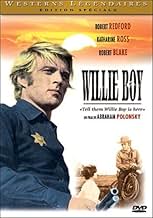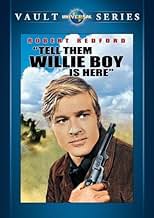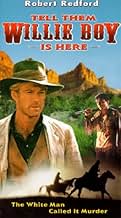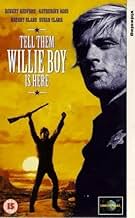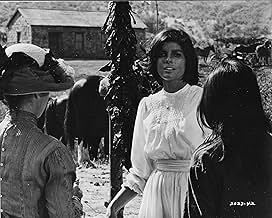Em 1909, quando o jovem indígena Paiute Willie Boy retorna à sua reserva, na Califórnia, para ficar com Lola, cujo pai o desaprova, um assassinato em legítima defesa ocorre, desencadeando um... Ler tudoEm 1909, quando o jovem indígena Paiute Willie Boy retorna à sua reserva, na Califórnia, para ficar com Lola, cujo pai o desaprova, um assassinato em legítima defesa ocorre, desencadeando uma enorme caçada humana por Willie.Em 1909, quando o jovem indígena Paiute Willie Boy retorna à sua reserva, na Califórnia, para ficar com Lola, cujo pai o desaprova, um assassinato em legítima defesa ocorre, desencadeando uma enorme caçada humana por Willie.
- Direção
- Roteiristas
- Artistas
- Ganhou 2 prêmios BAFTA
- 3 vitórias e 1 indicação no total
- Digger
- (as Eric Holland)
- Meathead
- (as Lee De Broux)
- Direção
- Roteiristas
- Elenco e equipe completos
- Produção, bilheteria e muito mais no IMDbPro
Avaliações em destaque
yes, it raises all the cross-culture misunderstandings, thats what makes it so tragic and so good. it makes you stop and think before you make that next assumption about someone you don't know....whose culture your only vaguely familiar with..not a bad thing to do today, then or anytime.
In 1969, the movie was received as part of the broader counter-cultural movement then flourishing. Certainly several of the film's themes resonated with the social justice wing of the movement, and I'm sure that for leftist writer-director Polonsky the justice-for-the-Indian theme was no stretch.
Seeing the film again after 40-years, I'm struck by how generally low-key it is, despite the highly charged potential. That's particularly the case with the lovers-on-the-run (Blake & Ross). Unlike such fugitive classics as You Only Live Once (1937) or They Live By Night (1947), this version refuses to sentimentalize the lovers. Despite standard expectations, Willie treats Lola pretty harshly and all but drags her along by the hair—a far cry from the usual pathos. Nor, for that matter, is the Coop (Redford)-Elizabeth (Clark) relationship romanticized, as she treats him with general disdain while he sexually humiliates her. (I doubt this film did anything for Redford's lover-boy image.)
At the same time, none of the principals is particularly likable, certainly a departure from usual box-office appeal. Coop may sympathize somewhat with Willie Boy, but he's clearly no reformer let alone racial crusader. He is, after all, an elected sheriff with a race conscious constituency, so his reserve is at least understandable. And, for that matter, neither is Willie Boy very likable. He may be a victim in an extended sense, yet he encourages little sympathy in his headlong flight for survival. If he's meant to represent Indian plight generally, it's certainly not an emotionalized appeal. In fact, the social justice element occurs only sporadically and through biting references to Indians' lesser worth as Indians. So, by no means, is the movie's message "piled on". Note too, how Polonsky refuses to caricature the one vicious racist, Calvert (Sullivan), in the manner of many other anti-racist films.
All in all, the movie comes across as something of an oddity since it follows no particular path other than its own. Clearly, Polonsky wants to avoid the more obvious pitfalls of movies with a message, and largely succeeds, at least in my estimation. However, the caution does come at something of a price. In short, so much of the material is low-keyed that I, for one, was never drawn emotionally into the dramatic events; instead I observed them at a distance, even Willie Boy's last stand, which should have been more of a grabber. Such detachment seems rather paradoxical for a film that should have strong impact given the themes and talent involved. My guess is that Polonsky used perhaps too much caution in dealing with what is admittedly tricky subject matter.
Nonetheless, it remains an interesting film, well acted and beautifully photographed, making good use of the barren edge of California's Mojave desert. I guess my only real gripe is with whoever did Ross's Indian make-up. As another reviewer aptly observes—it looks like it was slathered on with a ladle. Then there's the long lacquered hair that threatens at times to reach around and strangle her. Those minor misfires aside, Polonsky's project remains a curious one-of-a-kind, still worth a look-see, even if it's no longer the rebellious 1960's.
The title role of Tell Them Willie Boy Is Here is played by Robert Blake who is a Paiute Indian kid who by their tradition kidnaps the women of his intentions Katherine Ross to make her his bride. It's their way of courtship, but when Ross's dad objects he's accidentally shot and killed by Blake.
Ironically with a good lawyer Blake might have gotten off. But Paiute Indians usually don't get good lawyers and they don't take to confinement. Still this incident might have gone unnoticed but for the fact that the sitting president of the USA in 1909 one William Howard Taft was visiting the area. That brings in the national media and blows up the story.
Robert Redford plays the sheriff charged with bringing in Blake dead or alive. He never played quite the roughneck character he does in this film than in any other work I can recall. Susan Clark plays the doctor on the Paiute reservation who has her views routinely ignored as she's mansplained on a regular basis. She also has her needs fulfilled by Redford as both are the best of what's out there in their corner of the world.
It's Blake and Ross who really capture your attention. I'm sure that William Shakespeare would have seen so readily the parallels between his timeless classic and what Blake and Ross are all about.
Willie Boy was a 25 or 26 year old Paiute Indian. Isoleta Boniface was a 15 year old Paiute Indian girl. Isoleta's father, Old Mike Boniface was a Paiute Indian.
Willie Boy had an unrequited interest in Isoleta. Her father didn't like Willie Boy. Willie Boy kidnapped Isoleta the first time from the family's camp at Twenty-nine Palms, Ca. Her father found them, took her back and told Willie Boy that if he came near her again he would kill Willie Boy.
Some days later, after drinking with a White friend, Willie Boy went to the Gillman Ranch, near Banning Ca., where the Boniface family was working and crept up on Old Mike, his wife and their 7 children where they were sleeping under a Cottonwood tree. Willie Boy shot Old Mike in the head as he slept.
Willie Boy kidnapped Isoleta again and headed into the desert. He used her as a pack animal to carry whatever supplies he had. The posse, some of which were Paiute Indians, came upon a message scrawled in the dirt from Isoleta that read, "My heart is almost gone, I will be dead soon". When she couldn't go any further, Willie Boy shot her in the back and killed her.
Lawman Ben Crevecouer said, "The sight of that girl's body was something a person would want to forget, but couldn't. We came on it while it was still warm. Her clothes were just rags, she was welts and bruises all over, and there were cactus spines in her flesh. She had worn through her thin little shoes and her feet were raw and bloody".
The posse eventually discovered Willie Boy's body after chasing him for 11 days and 500 to 600 miles in Riverside and San Bernardino Counties in Ca.. Willie Boy killed himself with his last bullet.
Willie Boy was just a scumbag who murdered two of his own people but ,of course, this director, Abe Polonsky, turns the story into another anti-White Hollywood propaganda film.
Info from interview of Ben de Crevecouer in "Desert Magazine", Nov. 1941.
Você sabia?
- CuriosidadesAbraham Polonsky said to a USC film class at the time that he purposely shot and edited the manhunt sequences with characters moving in all directions across the screen, rather than in the usual way wherein both runners and pursuers would move in the same direction across the shots (i.e., left to right) to enhance the impression of urgent suspense in a chase. Instead, Polonsky was looking for a different feel for the audience, of the characters wandering, feeling their way through the landscape. He implied he was willing to sacrifice some suspense to externalize the characters' confusion. He also said that for Katharine Ross' brief, artfully lit nude shot, he exposed the film correctly but then produced a high-contrast copy of the same film frames with deep blacks and transparent lights, then bi-packed both pieces of films together to rephotograph. The high-contrast overlay ensured that the shadows on Ross' body were black--so that the image could not reveal more in the shadows than it was supposed to.
- Erros de gravaçãoMany of the hats worn in the film are not the style worn during the early part of the 20th century. Some in fact, could only have been sewn using machines created in the 1950s, nearly half a century after the film's setting.
- Citações
Dr. Elizabeth Arnold: Willie killed Mike and took Lola. They call it marriage by capture. The mother knew that and told her to go.
- ConexõesFeatured in A Hollywood Vermelha (1996)
Principais escolhas
- How long is Tell Them Willie Boy Is Here?Fornecido pela Alexa
Detalhes
- Data de lançamento
- País de origem
- Idioma
- Também conhecido como
- Willlie Boy, o Rebelde
- Locações de filme
- Pioneertown, Califórnia, EUA(shoot out near end, Pipes Canyon)
- Empresa de produção
- Consulte mais créditos da empresa na IMDbPro
Bilheteria
- Faturamento bruto mundial
- US$ 5.949
- Tempo de duração
- 1 h 38 min(98 min)
- Cor
- Proporção
- 2.39 : 1


